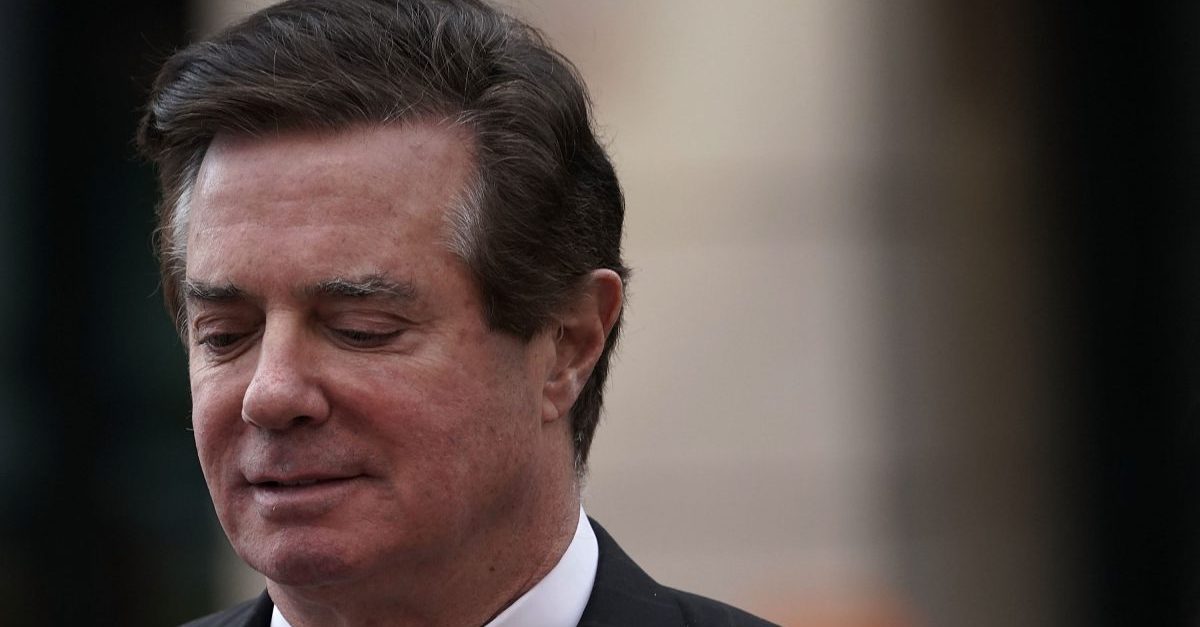
Paul Manafort has been behind bars ever since a federal judge in Washington, D.C. revoked his pre-trial release for violating his bail conditions as he faces money laundering charges. According to a new court filing that his attorney submitted to the D.C. Circuit Court of Appeals, the former Trump campaign manager isn’t just behind bars, he’s in solitary confinement.
“He is locked in his cell for at least 23 hours per day (excluding visits from his attorneys), at a facility approximately two hours from his legal team,” Manafort’s attorney Frank P. Cihlar wrote. This confirms a previous claim from President Donald Trump‘s former attorney John Dowd, who said in June that Manafort was in solitary.
So why would someone like Manafort, who isn’t exactly accused of violent or dangerous crimes, be in solitary confinement? Law&Crime asked several criminal attorneys for their take on the issue, and if Manafort’s situation is normal.
Former federal prosecutor Henry Hockeimer said that this “certainly puts pressure on Manafort to work out a deal.” While he acknowledged that there could be a safety concern under the presupposition that other people in the prison know who Manafort is and would want to hurt him, this sort of thing is “not typical for the pre-trial detention of a white collar defendant.” At the same time, Hockeimer recognized, “alleged tampering with witnesses prior to trial also isn’t typical.”
Others with expertise in this area disagree.
“Yes it’s normal, when someone like him can’t be in “gen pop” (general population) due to a separation order for safety,” white collar defense attorney and Law&Crime trial analyst Caroline Polisi said. “Prisons are so understaffed that there is just no way they could otherwise guarantee his safety if he were allowed to access the public areas of the facility, given the high profile nature of his case. … He’s not getting anything special just because he’s Paul Manafort. This is the way they’d do it for anyone else if they felt his safety was in question.”
Criminal defense attorney and Law&Crime trial analyst Julie Rendelman had a similar take.
“It is not unusual when a ‘celebrity’ or well known individual is incarcerated in a federal facility to be put in this type of confinement,” Rendelman said, “when there is concern for that individual’s safety i.e. another inmate might go after Manafort to make a name for themselves in the jail.”
This goes along with what Dowd said, when he told Fox News, “The warden is concerned that someone would violently attack Paul just for street cred.”
Rendelman noted that while some people may request being placed in solitary for safety, “There has been a lot written about the dangers of this type of confinement to the mental state of the individual.”
Despite the pressure that solitary confinement may put on Manafort, he has held strong thus far, even while his associate and former co-defendant Rick Gates already pleaded guilty and agreed to cooperate with Mueller’s investigation. Since then, Manafort has been hit with additional charges and his pre-trial release has been revoked.
Manafort’s trial in D.C. federal court is scheduled to take place in September. He has another trial, for alleged bank and tax fraud, set to start on July 26 in Virginia federal court. Both trials are based on alleged offenses having to do with Manafort’s work for the Ukrainian government.
[Image via Alex Wong/Getty Images]